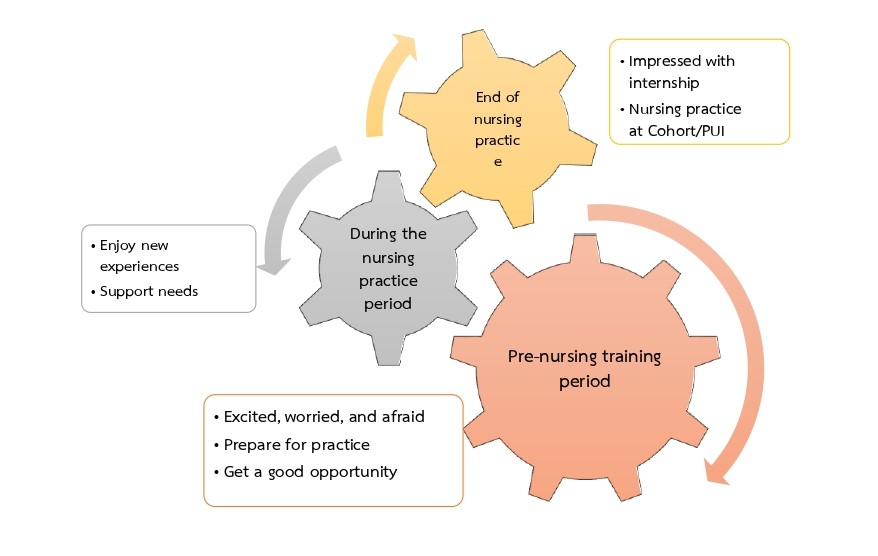AN EXPERIENCE OF NURSING PRACTICE OF 4TH YEAR BACHELOR OF NURSING STUDENTS IN SITUATION OF THE CORONAVIRUS OUTBREAK 2019: PHENOMENOLOGY STUDY
Keywords:
Situations, Nursing Practice, Nursing Students, Coronavirus Outbreak 2019, Phenomenology StudyAbstract
Background and Objective: Learning management in the 21st century was challenging for the Thai education system, where learning experiences were not just performed in the classroom. The learning had to be designed and conducted in conditions as close to real life as possible. It should have been in a context or environment that allowed students to accumulate experiences, especially creating learning experiences about patient care for nursing students. The purpose of this study was to gain an understanding of the nursing practice experience of 4th year bachelor of nursing students in the situation of the coronavirus outbreak in 2019.
Methodology: This research used a qualitative approach with the Hermeneutic Phenomenology technique. By purposive selection on the mentioned criterion, the key informants comprised a group of fourteen nursing students and six nurse preceptors who volunteered to participate in this study. The data collection and instruments used were a tape recorder, personal documents, and an in-depth interview. Trustworthiness in this study came from the triangulation of various data sources, such as interviews, observations, and field notes, used to gain credible data. The texts also contained some embedded quotations that helped ensure the transferability. Dependability: The researcher, who had experience in qualitative research, reviewed the audiotapes, translation, data analysis process, and results. For confirmability improvement, the bracketing, in which the researcher set aside personal experiences as much as possible, was assured. The method described by Miles & Huberman was employed to analyze the data, with a special reference to NVivo.
Main Results: The significant findings of the research consisted of three base themes and seven sub-themes: 1) Pre-training phase included; 1.1) Emotions; 1.2) Prepare for practice; and 1.3) Get a good opportunity. The students were excited and worried about training. However, they recognized the excellent opportunity to learn from this experience, increasing their practical knowledge in their future careers; 2) Experiences of nursing students included; 2.1) During the nursing practice; 2.2) Support needs. The students enjoyed their experience, which was fun and challenging to work in the assigned position. They learned how to work with doctors and nurses and gained more knowledge; and 3) The end of nursing practice included; 3.1) Impressed with the internship; 3.2) Nursing practice should be provided at the Cohort/PUI ward. The students were impressed and happy. They were grateful for doctors, nurse preceptors, nurses, mentors, and patients who contributed to giving knowledge and good experiences. They gained more knowledge about self-care and how to protect themself from COVID-19.
Involvement to Buddhadhamma: Developing students' wisdom through teaching and learning with real experiences aligns with the Buddha's teaching method. It uses real situations as a teaching medium and has had good results. The principles and teachings of Buddhism emphasize practice along with the educational process. One of them is called Saddhamma, which consists of three main elements: 1) Pariyatti-saddhamma, which implies the textual aspect of the true doctrine; 2) Paṭipatti-saddhamma, which implies the practical aspect of the true doctrine; and 3) Paṭivedha-saddhamma, which implies the attainable aspect of the true doctrine.
Conclusions: Nursing students, therefore, prepared themselves by searching for more knowledge about this disease. Preparing knowledge and nurse preceptors allowed them to study and acquire knowledge in real situations. It reflected on students to see the truth. It could have made students more thoughtful and grateful for the experiences, as the Buddha used real situations as a teaching medium.
References
Bogdan, R. C. & Biklen, S. K. (2003). Qualitative Research for Education an Introduction to Theory and Methods. Allyn and Bacon.
Heidegger, M. (1962). Being and Time. Harper & Row.
Inthachot, M. (2017). Self-Directed Learning Readiness for 21st Century Skills of College Students in Thailand. Phranakhon Rajabhat Research Journal (Humanities and Social Sciences), 12(1), 205-212. (In Thai).
Jamjang, S., Atthamatakul, W., Nilliaum, R. & Wongyara, N. (2021). The Effects of Simulation-Based Learningon Problem Solving Ability, and Self-confidence in Nursing Care on the Patient with Health Problem of Nursing Students. Journal of Prachomklao College of Nursing, Phetchaburi Province, 4(3), 178-194. (In Thai).
Lincoln, Y. & Guba, E. (1994). Competing paradigms in qualitative research. In N.
Mamidipalli, S. S., Sree, K.P. & Supriya, M. (2020). Mental health problems faced by healthcare workers due to the COVID-19 pandemic–A review. Asian Journal of Psychiatry, https:// 51:102119. 10.1016/j.ajp.2020.102119 .
Miles, M. B. & Huberman, A. M. (1994). Qualitative data analysis. (2nd ed.). SAGE.
Musikthong, J., Puwarawuttipanit W. & Udomphanthurak, J. (2017). Learning Experiences from Clinical Practice in Medical Units and Perceived Self-Development of Nursing Students in a Bachelor of Nursing Program. Nursing Journal of The Ministry of Public Health, 27(2), 181-97.
Phimchaisai, P. & Wongchantorn, N. (2018). The Factors Influencing Achievement of Practicum in Nursing Care for Mother, Infant, and Midwifery 1 of Nursing Students at a Private University in Nakhon Pathom Province. Journal of The Royal Thai Army Nurses, 19(1), 154-163.
Rolfe, G. (2006). Validity, trustworthiness, and rigor: Quality and the idea of Qualitative research. Journal of Advanced Nursing, 53(3), 304-310. https://doi.org/10.1111/j.1365-2648.2006.03727.x
Woramethisrisakul, U., Deesuankhok, C., Nangtharaj, A., Wiangkha, S., Buachuay, S., & Srirawan, S. (2018). Buddhist teaching methods. Journal of graduate studies Mahachula Khon Kaen, 5(1), 71-81.

Downloads
Published
How to Cite
Issue
Section
License
Copyright (c) 2023 Journal of Buddhist Anthropology

This work is licensed under a Creative Commons Attribution-NonCommercial-NoDerivatives 4.0 International License.








